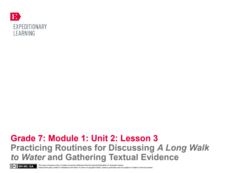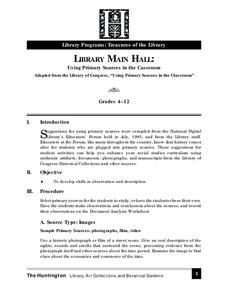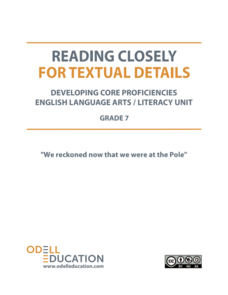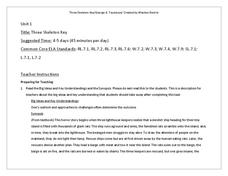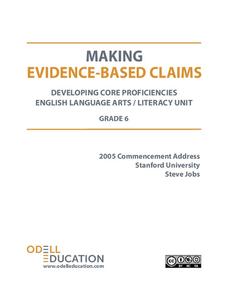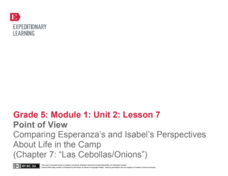Warren County Public Schools
Citing Textual Evidence
By using explicit textual evidence, individuals can strongly support their ideas and opinions. The presentation suggests in order to use explicit textual evidence, one must state their idea, cite evidence in the text that led...
EngageNY
Practicing Routines for Discussing A Long Walk to Water and Gathering Textual Evidence
Welcome a new teacher (or two)! While most of the class works on the survival anchor chart, one pair begins the Salva/Nya chart and uses it to teach the class. Each day, scholars switch roles, giving every pair a chance to teach their...
Scholastic
Citing Text Evidence
Could you go without your cell phone for 48 hours? Pose this question to your class and then read the article provided here. Pupils mark the text and and complete a graphic organizer that requires the use of textual evidence.
Curated OER
Inferences Using Evidence
What is an inference, and how can you use textual evidence to create one? Introduce your developing readers to the world of inferencing with this presentation. Terms are defined, and several examples are shown. The class works together...
Curated OER
Using Primary Sources in the Classroom
Scholars study a historical photograph to make predictions of what happened right after the picture was taken. They research a variety of different topics and use primary sources to answer questions about common food, fashion trends, and...
Literacy Design Collaborative
Using Textual Evidence to Analyze Literary Responses to Historical Events
Scholars analyze Animal Farm to learn how to add textual evidence into essays to support their ideas. They search for a deeper meaning to the story and how it relates to the text Totalitarianism and Revolutions in Russia. To finish,...
Bright Hub Education
Using Evidence and Supporting Details in Writing
In expository writing, it is important to back up claims with evidence and details. Help your class to develop their writing with notes on different types of evidence. Once they have the basics down, practice with a sample thesis and...
EngageNY
Mid-Unit 2 Assessment: On-Demand Informational Writing
Lesson 7 focuses on building academic vocabulary and writing an explanatory letter with supported textual evidence. For the first five minutes of the lesson, the educator reminds the class of how to read and refer to the accordion...
Curated OER
"Too Much Pressure" by Colleen Wenke
Have you ever cheated on a test? What about copied someone else's homework? After reading Colleen Wenke's essay "Too Much Pressure," class members use the provided reading comprehension questions to focus their analysis of important...
Curated OER
Is That a Fact?
Investigate popular scientific claims and gather evidence to defend or argue against an author's stance. Writers synthesize information and compose their own "Really?" columns modeled after those found in the weekly "Science Times"...
Odell Education
Reading Closely for Textual Details: Grade 7
Enhance the reading experience with a set of lessons designed to improve textual analysis. Seventh graders use guiding questions to read both informational text and literature closely in the first part of the unit. Next, they work on...
Washoe County School District
Three Skeleton Key
Conduct a close reading of George G. Toudouze's well-known horror story "Three Skeleton Key." This plan breaks up the reading into several steps and provides text-dependent questions to ask along the way. Learners will have the chance to...
Odell Education
Making Evidence-Based Claims: Grade 6
In order to make evidence-based claims, one must be able to draw explicit information from text. From here, learners take that information, analyze the text to develop a deeper understanding, and connect with the information in order to...
Curated OER
The Study of Theme and Figurative Language in Poetry and/or Prose
Identify and analyze the use of figurative language used in select pieces of writing. These pieces of literature will represent at least two pieces by one writer and at least two pieces by different writers. This lesson would be a great...
Curated OER
Because of Winn-Dixie Scrapbook
Here is a fun resource that your kids will love. While reading the book Because of Winn-Dixie, they analyze the story's main characters by creating an online scrapbook. The purpose is to have them identify character traits and use...
EngageNY
Point of View: Comparing Esperanza's and Isabel's Perspectives About Life in the Camp (Chapter 7: "Las Cebollas/Onions")
Explore point of view and more with a Common Core-designed instructional activity. Learners experience different points of view by representing one of two characters from Esperanza Rising during a partner discussion. They must use...
EngageNY
Scaffolding to Essay: Using Details to Support a Claim
Show me the evidence. Writers analyze the Command of Evidence row of the rubric for A Long Walk to Water essay. Pupils work in pairs to determine how the writer of a model essay meets the demands of the rubric. They then use a Forming...
Curated OER
Kumeyaay Indians
Useful for literary analysis, citing textual evidence, or summary skills, this lesson about the Kumeyaay Indians would be a good addition to your language arts class. Middle schoolers read novels and summarize the literature in their own...
Reading Worksheets
Inferences Worksheet 9
Help your pupils take charge of their inferring abilities with an exercise designed for direct practice with making and supporting inferences. Learners read four short passages and answer two to three questions for each passage that...
K12 Reader
"How Do I Love Thee?" Supporting Ideas
Show your class what poem the famous line "How do I love thee? Let me count the ways" comes from. Class members read Elizabeth Barrett Browning's poem and respond to one question with a short paragraph. The question asks learners to use...
Curated OER
The Effects of Slavery
The emotional and spiritual oppression of slavery in the African-American experience is the focus of this lesson. Middle schoolers analyze various texts by Frederick Douglass and Maya Angelou related to freedom and oppression....
Curated OER
My Antonia: Directed Reading Thinking Activity
Walk your pupils through the beginning of My Antonia by Willa Cather with a read-aloud-style activity. The goal is to make predictions and back them up with textual evidence.
Curated OER
Introducing Jane Eyre
"How can a magazine reflect a particular time and culture?" Using this prompt, your class explores the Victorian Era as it relates to Charlotte Bronte's Jane Eyre. They can also play the "Victorian Women's Rights" game for the year 1840...
Odell Education
Making Evidence-Based Claims: Grade 8
American women have been working toward equal rights since the ink dried on the Declaration of Independence. Focused on the words and actions of Sojourner Truth, Shirley Chisholm, and Venus Williams, a language arts lesson takes eighth...



